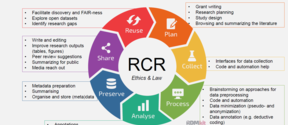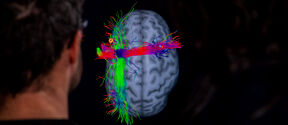AI and Research Work - Useful learning materials
Open learning materials on using AI in research produced by Aalto University Data Agents.

Artificial intelligence (AI) based technologies, especially general purpose AI tools built upon large language models such as ChatGPT and text-to-image DALL-E, have quickly gained popularity, and Aalto University also provides help in their usage. They are able to generate text and artwork which are hard to distinguish from human-generated ones. While we encourage their usage, an obvious question arises: if they are used in research work, are there any issues with research integrity and responsible conduct of research? Can we find guidance on appropriate usage of AI tools when conducting research?
Literally speaking, the range of "AI tools" may vary from a spell-checker to the full functionality of GPT-type tools, but here we refer to generative AI, technologies based on large language models which able to generate human-imitating text, code or artwork.
To narrow down the presentation: the discussion “ethical AI”, whether the outcomes of an AI system are ethical and responsible, is important and there is a lot of research on how and whether it can be ensured that the outcome of an AI system is fair, nonbiased and nondiscriminative. Nevertheless, for clarity and conciseness of presentation, our approach here is more narrow. We are concerned about the research process itself, along the lines of research integrity and responsible conduct of research as advised by Finnish National Board of Research Integrity TENK: reproducibility; bearing responsibility on the correctness of the results presented; respecting the authorship of others; and data protection. How to interpret these concepts now?
The topic is evolving in time as new AI tools become available, but for the time being, Aalto University's guidance is the following:
Reproducibility: If you used an AI system, you should disclose the technical details and parameters so that someone else can verify your results on their own. Online generative AI services (such as various versions of OpenAI ChatGPT) are often updated and sometimes discontinued, making it impossible to reproduce exactly the same results.
Accountability: You are responsible for the correctness of the results you present. The current tools sometimes provide nonsense. Reference to an AI system cannot be used as a disclaimer or an excuse for incorrect results.
You need to respect the authorship of others by citing their work where appropriate. ChatGPT’s output may be based on someone else’s results – can you trace it back to the original references? See more on AI and copyright in this page.
GDPR is to be followed – nothing new here either. Do not feed in confidential information or personal data unless you can trust the way the system is handling it. At the moment (6/2023), online OpenAI services such as ChatGPT are not GDPR compliant. Only public data can be uploaded in them. There exist local implementations where one can feed personal data to a large language model that runs locally while ensuring full data protection, see more at https://www.aalto.fi/en/services/productised-ai-and-openai-services-in-aalto. If you get personal data as an output, then you are responsible for handling it in an appropriate way, and informing the subjects.
Make sure that you protect your unpublished work. By feeding text or data from unpublished manuscripts or grant applications into online AI systems, you might be giving the permission to reuse your data. Your unpublished work might then be used for training future versions of language models, or passed to third parties (e.g. ChatGPT plugins) without any transparent mechanism, making it impossible for you to trace where your unpublished text or data have gone and how they will be reused.
If you use code written by ChatGPT you cannot check the licenses of the code snippets that ChatGPT is using. Apart from the problem with licenses, a good idea is to publish your code in an open source repository so that anyone can check its correctness.
Again, artificial intelligence is only a tool in artistic work, and should not be given authorship. When creating artistic output, contributor roles must be explained transparently and specifically.
Use of copyright protected artwork to train an AI system is allowed both in the US and EU when following the applicable copyright legislation exception rules. Obviously, AI-based image generators have been trained on material which was copyright protected. If you use an AI-based image generator, you might receive output which contains copyrighted material. Applicable copyright legislation is to be followed when you publish something based on such output.
Whether you have any copyright on your output is another question, and e.g. the US Copyright Office has stated that copyright only protects creations made by humans. That is, copyright will only protect aspects of the work that are original works by the authoring human.
See more on AI and copyright in this page.
The topic is constantly evolving and new powerful AI tools enter the market at unpredecented rate. We need to keep updating the guidance and you can participate in the discussion. Please do not hesitate to contact the persons listed in the end of the page.
To learn more about Aalto University's IT services for AI, please see https://www.aalto.fi/en/services/ai-services
To learn more on how to use generative AI for the various stages of the research process, check the page AI and Research Work - Useful learning materials.
Aalto University also provides guidance for the use of artificial intelligence in teaching and learning.
Regarding authorship and accountability, our approach is in line with major publishers, see for example the authorship policies of Nature, Science and Elsevier journals.
Responsible conduct of research with generative AI technologies is only one aspect of the broader ongoing discussion on the Ethics of AI. OECD AI Principles offers a comprehensive overview of the topic. The European Commission has published the AI Act and a guideline on the responsible usage of generative AI in research.
There are several open questions regarding intellectual property, see for example this news item from the European Commission. Aalto University's guidance on AI and copyright is here.

Open learning materials on using AI in research produced by Aalto University Data Agents.

Information on Aalto University's official and productized AI services

Research integrity and responsible conduct in research are based on binding guidelines agreed within the research community.

Guidance and documents available to help you to agree on authorship.

The guidelines are intended for Aalto University researchers and the service staff who support them. Their purpose is to describe the practical questions that researchers must think about and the documents that must prepared if the research collects and processes personal data.

The Aalto University Code of Conduct is one way of putting our values and way of working — the foundation of our community culture — into practice

Here we provide support, links and tips on how to work your way through the EU Grants: How to complete your ethics self-assessment – document
AI systems, AI models and copyright questions related to them.

